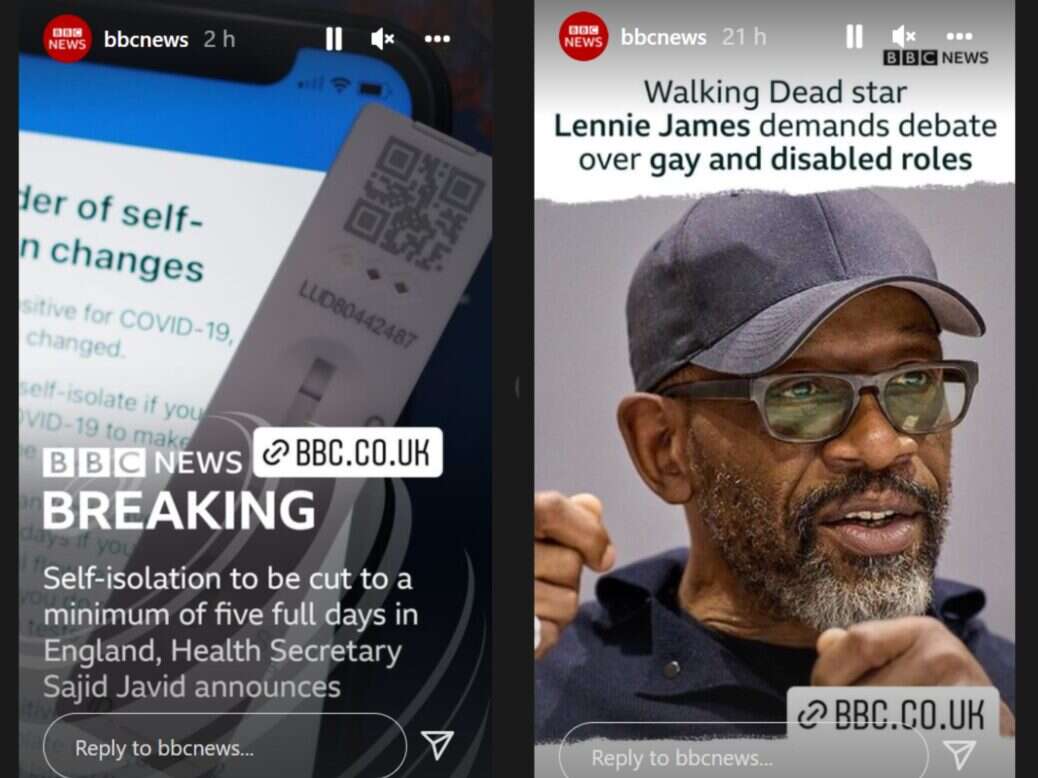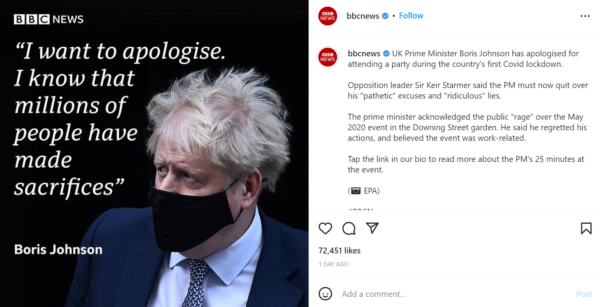
BBC News crossed 20m followers on Instagram in December – the first news account in the world to do so.
The closest news account on the platform is CNN with 16.3m followers. The next biggest UK-based newsbrand is The Guardian on 4.9m.
Although all major newsbrands saw their Instagram accounts grow as the Covid-19 pandemic led to a demand for trusted news sources, BBC News has done particularly well out of it.
[Read more: Why Sky News, unlike the BBC, is embracing TikTok and Snapchat]
BBC News head of social Jeremy Skeet told Press Gazette there is a simple formula of four things that have helped the account grow:
- “laser-like focus” on the audience
- regular posting
- creating more explainers especially in relation to Covid-19
- and using text on images.
“Obviously we’ve tweaked various things as we’ve gone along,” he said. “But fundamentally, I think that’s what’s driven our growth and lots of other people’s growth.”
The figure marks major growth since early 2018 when the account had 4.4m followers. At that time, the social team changed strategy from only posting videos to experimenting with a mixture of photos, IGTV [now Instagram TV], stories, and, later, adding text to images.
Of course, the BBC is one of the biggest and most-trusted newsbrands in the world - and this has especially helped during the Covid-19 pandemic as platforms committed to boosting trusted and authenticated news sources. But, as Skeet said, that cannot be taken for granted when growing social accounts like this: "we can't get it wrong".
Amy Fox, executive digital editor for BBC News, added: "We've got an incredibly strong reputation on which we build but, crucially, we contribute to that strong reputation as well and it will only continue to exist with the type of great content that the social team are driving towards and our digital journalism provides as well."
Skeet said Instagram, which was founded in 2010, was a "mature enough platform" that news "became quite important" on it during the pandemic.

Example of a BBC News Instagram post
Conversely, BBC News has not joined TikTok (founded in 2016) and no longer runs an account on its predecessor Snapchat (2011) despite experimentation back in 2016.
[Read more: A guide to TikTok for publishers (featuring 'Washington Post TikTok guy')]
Skeet said: "We have to be true to our brand, true to BBC News. So what we're not going to do is light news on TikTok. If we go onto TikTok, we'd be true to the newsbrand so we'd be able to report any news in the way that we'd want to."
There is a general BBC TikTok account sharing clips linked to its entertainment shows with 1.1m followers, and former BBC journalist Sophia Smith Galer, who has moved to Vice World News, won a British Journalism Award in December for her own use of TikTok for storytelling.
Skeet admitted it was a gap in BBC News's quest for younger audiences - more than half of TikTok's users are believed to be under 30 - but said: "We're only going to go on to these platforms if editorially we think they're the right platforms to be on and we can create the content that would work on this platform and work for BBC News.
"We haven't really got the resources to do video solely for TikTok so we're not going to do that."
Instagram has a similar age profile with more than half of its global user base thought to be aged under 34, while Skeet said the biggest audience for BBC News on the platform is in their early to mid-20s.
Fox said BBC News is exploring a longer-term strategy for the use of digital video which "takes a variety of platforms and formats" - not just on social media.
The BBC News website itself is also currently being modernised to better reach younger audiences.
Ofcom found in its 2021 annual report on the BBC that the corporation is "taking steps to better serve less-satisfied audiences and to build stronger links with younger audiences".
The desire to get people to the BBC News website itself is partly why the account has not done much with short video format Instagram Reels or Live videos - although both may be the subject of more experimentation this year.
According to a spokesperson, the BBC News Instagram account now "regularly drives more than 700,000 clicks back to the News site every week – more than five times higher than the 2019 average".
Skeet said: "If you look at the context, five years ago there was no news on Instagram but what Instagram has changed is how literate we are in visuals, I think it changed it across the internet.
"And I think what TikTok and other short-form video sites are doing is changing our language of video and it's like how do we reflect that language going forward, both on social and on our platform?
"So I think that's sort of at the moment what we're looking at. It's like, what does short-form video in news look like? And not many people are doing it. So I think the jury's out what it looks like, but I think more and more people are going to be experimenting."
The five biggest audiences by follower count to the BBC News Instagram page are India, US, UK, Nigeria, and Brazil. The most engaged audiences are in the US, India, UK, Canada and Nigeria.
Asked how best to make one page cater to such a global spread of news audiences, Skeet said stories about Covid-19 vaccines, vaccine hesitancy and anti-vaxxers had all done particularly well, as had Black Lives Matter.
"A lot of the things that young people are particularly are interested in, [although] not only young people, are things that are cross border," he said. "It's more about the generality rather than the specifics.
"What wouldn't do well on Instagram is minor changes to lockdown rules when we're in lockdown, but the generalities of how France or how Europe or how the rest of the [world] are reacting to the Covid outbreak are of interest to everybody around the world. Likewise, other [non-Covid] stuff."
The two main questions though remain simple: whether a story has good pictures and how to write it in the most engaging way possible.
The BBC News account is run by a ten-strong social media team including Instagram lead Kady Wardell. The team is one of several at BBC News that is moving jobs out of London - including Skeet and Fox - to be based around the UK and become more representative of society.
Of the social team, whose new base will be at the BBC's Cardiff headquarters, Fox said: "It is quite a small team in comparison to the size of reach that they have, which makes it all the more impressive."
[Read more: Some 550 BBC jobs closed or moved as news shifts away from London]
Email pged@pressgazette.co.uk to point out mistakes, provide story tips or send in a letter for publication on our "Letters Page" blog
